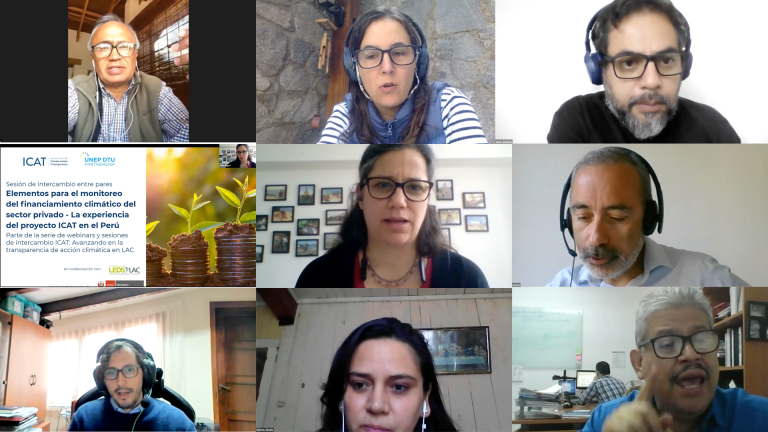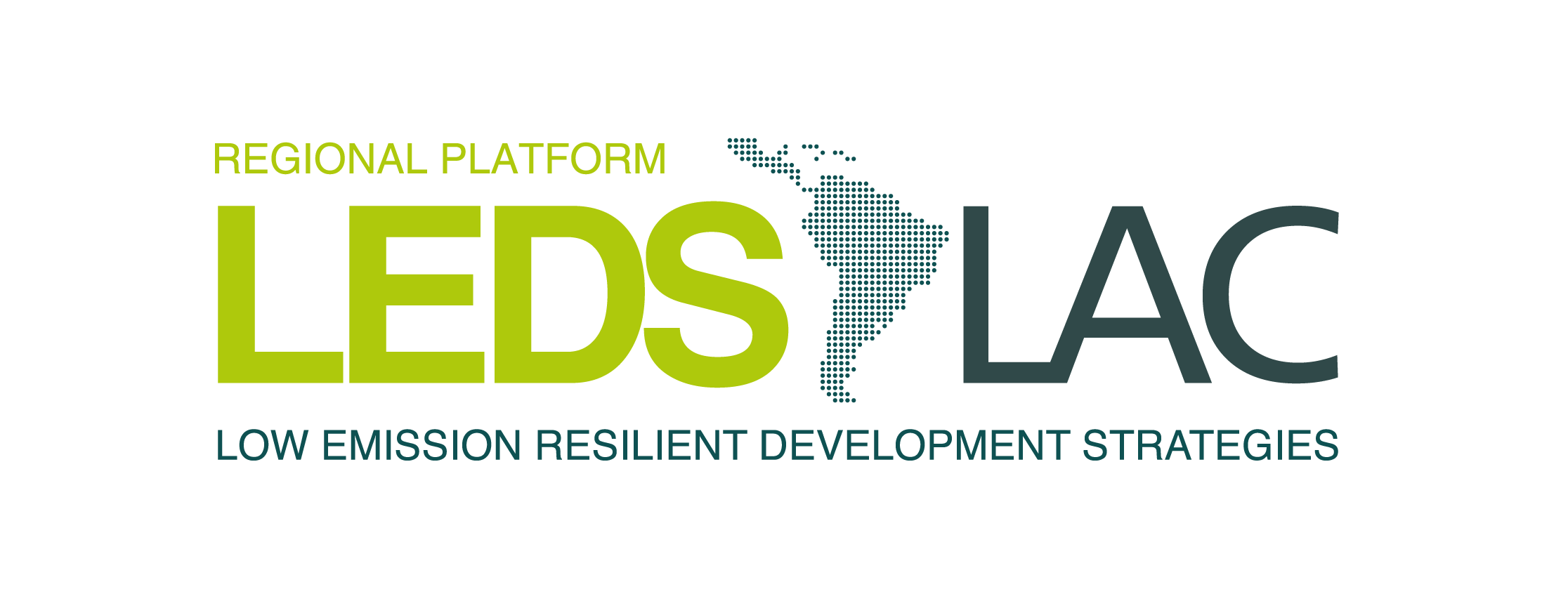ICAT, LEDS LAC and UNEP DTU Partnership organized an exchange session for those involved in climate finance monitoring methodologies in the private sector in Latin America where the ICAT experience in Peru was presented.

- June 30, 2021.

On Wednesday, June 2, the peer-to-peer exchange session ".Elements for monitoring private sector climate finance - The experience of the ICAT project in Peru". organized by the LEDS LAC platform together with the UNEP DTU Partnership (UDP) in the framework of the Climate Action Transparency Initiative (ICAT) and with the participation of the Ministry of Environment of Peru (MINAM). The objective of the session was to show the progress to date in the design of a reporting and monitoring system for domestic private finance and the elements that could be part of a roadmap for implementation that is being developed by the government of Peru, with financial and technical support from ICAT and UDP. This presentation was followed by a collective reflection on the topic with the experience of participants from other countries in the region. The session included introductory remarks by Rosa Morales Saravia, General Director of the General Directorate of Climate Change and Desertification (DGCCD) of MINAM and Ivana Audia, technical advisor on climate change at UDP and the keynote presentation was given by Roberto Piselli, climate finance specialist at the DGCCD of MINAM. Participants came from Peru, Uruguay, Mexico, Colombia, Honduras and Argentina. The main messages of the session are shared below.
Peru is in the process of building a Monitoring System for Adaptation and Mitigation Measures, as mandated by the Framework Law on Climate Change and its regulations, and which responds to the Enhanced Framework compliance of Transparency of the Paris Agreement. This system has three essential pillars: adaptation, mitigation and financing, which in turn considers public, private, international climate funds and international cooperation resources. Recognizing the importance of the private sector in achieving transformational change, one of the elements included in the third pillar of the system seeks to follow up on private climate finance.
Since 2018, the ICAT project in Peru has provided support to MINAM in strengthening the transparency system. This support has focused on two main activities: (1) Capacity building for the development of the national greenhouse gas inventory, and (2) Development of a methodology for the design of the Financing Registry. This second activity includes the analysis of international experiences on methodologies for monitoring and reporting private sector investment in climate change and the development of a proposed methodology for monitoring the financial flow of the private sector in climate change in the country.
With respect to the international experiences that served as input for the proposal, on the one hand, initiatives were mentioned that provide a general framework for the design of the system, such as the "....rulebook"The Paris Agreement and the requirements for biannual reporting of financial flows, the Rio Markers, the recommendations of the Latin American and Caribbean Finance Group (GFLAC) and the International Finance Corporation (IFC). On the other hand, there are several international initiatives that promote the mobilization, transparency and/or disclosure of information from the private sector, such as the Network of Central Banks and Supervisors for Greening the Financial System (NGFSThe United Nations Environment Programme (UNEP) Finance Initiative (UNEP FIThe Climate Disclosure Standards Board (CDSB), the Climate Disclosure Standards (CDSB among others. As for similar experiences in countries of the region, the monitoring initiatives of Colombia and Costa Rica were taken as a reference. These countries use existing information or reports and identify actions that contribute to mitigation, adaptation or both.
In addition to international experiences, a review was made of existing initiatives in Peru that contribute to the design of the monitoring of private sector financing and investment, under the consideration that the proposed scheme should be based on existing national systems and from them propose improvements or new elements that may be required. As a result, the Superintendence of Banking, Insurance and AFP (SBS) - with a monthly reporting obligation and a reporting platform already implemented, the Superintendence of the Securities Market (SMV) - incorporates the Corporate Sustainability Report in its annual report, the Responsible Investment Program (Programa de Inversión Responsable (PIR) - promotes responsible investment among the country's financial stakeholders, the program Carbon Footprint Peru - voluntary participation tool to recognize the GHG emission reduction effort of public or private entities, or the Green ProtocolThe voluntary agreement between the national government and the financial system that seeks to facilitate the development of sustainable finance. All these initiatives already underway coincide in encouraging private sector reporting and transparency.
With these inputs, elements have been identified to contribute to the discussion on the design of the monitoring proposal, which include a focus on regulatory and another volunteer. It was mentioned that the regulatory approach, which takes information from financial regulators such as SBS and SMV, ensures greater coverage and reliable, verifiable and standardized information, but at the same time implies training, awareness and prior coordination. This would make it possible, for example, to monitor the climate funds that companies obtain from third parties. On the other hand, it was stated that the voluntary approach, which would capture the financing of actions with their own resources, is a valuable option for committed companies that wish to make their investments in climate change visible and be recognized.
Based on the proposal, some identified elements were presented that could eventually integrate the roadmap for the development of the Registry of Private Finance for Climate Change, which has five stages:
- To fit the implementation of the Registry for Private Climate Finance (RFPCC) into systemic processes.
- Identify the detailed map of actors providing private climate change finance
- Design and implement a capacity building program.
- Analysis of reporting and verification systems
- Development and implementation of normative, regulatory and institutional mechanisms for the progressive implementation of the RFPCCC.
For each of the stages, the operational feasibility and regulatory/institutional feasibility were analyzed on a scale that evaluates the complexity or difficulty of implementation. This analysis identified that the feasibility of implementing the roadmap would have a medium-high level of complexity. The difficulty is related to the fact that although the private sector has a good level of approach and awareness of the issue, the issue is seen as important but not urgent, the costs related to climate action are perceived more than the opportunities, and reporting is not mandatory.
To assess the feasibility of implementing the elements identified, a pilot exercise was carried out involving four stakeholders. Excel formats, an orientation guide and a questionnaire were developed to gather the experience of applying the methodology. The exercise made it possible to identify the usefulness of the formats as well as the difficulties in collecting the information and the adjustments that would be necessary in the existing systems in terms of periodicity and type of stakeholder.
Finally, 4 key points were identified as lessons learned:
- The proposed scheme should be based on national systems existing;
- It is essential to develop a taxonomy of finance The project will be carried out in a participatory manner that includes the efforts of the private sector and that allows defining whether private sector activities contribute to mitigation or adaptation;
- It is necessary to strengthening capacities and knowledge on green finance, there are systems that collect information from financial administration or banking and finance organizations, but the inclusion of environmental aspects to monitor sustainability elements is pending; and
- The following are required establish regulatory mechanisms to formalize the reporting obligation in order to move forward with implementation.

In conversation with participants from countries in the region, additional elements were discussed, such as:
- Currently there are reporting channels for the private sector (e.g. carbon footprint or mitigation measures), how do we incorporate in this space the possibility of also reporting on financing issues in a sort of single window? It seems necessary to simplify the reporting channels so as not to overload the requirements. Linked to this, a reflection was made on whether it would be necessary to have a "minimum" amount of financing on which reporting is encouraged in the case of voluntary reporting channels.
- On reporting requirements, for example, under the Paris Agreement (BUR or BTR), it would be important that the design of the system is linked to the demand for climate finance information needed to be included in these instruments.
- Although the focus of the presentation was on GHG mitigation actions, it was recognized that there are similar challenges in adaptation issues. In this sense, it is important to articulate the actions included in the NDCs, the information collection systems and the monitoring and reporting mechanisms.
- Key to the involvement of the private sector in voluntary reporting systems are the incentives provided for this purpose.
- Since the small and microenterprise sector is an important sector in the region, it is essential that the contribution resulting from microfinance be incorporated into this type of system.
About LEDS LAC
LEDS LAC is a platform for collaboration and action, driven by Latin American and Caribbean countries, to support the implementation of LEDS and NDCs, increase the ambition of emission reduction and adaptation targets, and define medium and long-term strategies, with a vision of a resilient and low-emission region.
LEDS LAC is the regional platform for Latin America and the Caribbean of the Low Emissions and Climate Resilient Development Strategies Global Partnership (LEDS GP). Launched in 2012, LEDS LAC operates under the general principles of LEDS GP, has an independent Steering Committee formed by representatives of international organizations, governmental institutions and NGOs from the region, and a Secretariat operated by Libélula - Climate Change Management and Communication, from Peru.
About ICAT and UDP
There is a growing demand for climate transparency information in Latin America and the Caribbean (LAC). With the approval of the Katowice rules at COP24, several countries in the region have sought to strengthen their reporting systems with international support. The Climate Action Transparency Initiative (ICAT) has been one of the most active initiatives in this area. ICAT's mission is to help countries better assess the impacts of their climate policies and actions, and to help them achieve their climate commitments. In this way it aims to contribute to greater transparency, effectiveness, ambition and confidence in global climate action. To date, ICAT has developed a varied toolbox of methodologies and tools for this purpose; and in LAC, ICAT projects have been implemented in Argentina, Chile, Colombia, Costa Rica, Cuba, Dominican Republic, Ecuador, Mexico and Peru. For its part, the UNEP DTU Partnership (UDP) has been involved since the beginning of the initiative as a leader in the execution of ICAT projects in the countries, assuming coordination roles, providing technical assistance and coordinating activities to improve technical exchanges between countries.
